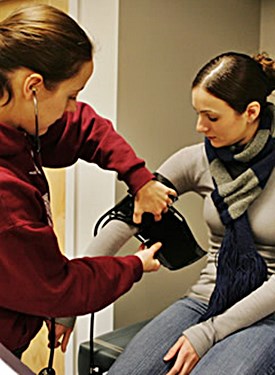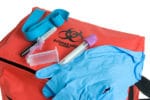Choosing phlebotomy as a career can be as rewarding on an emotional level as it is on a practical level. You get to work with so many different types of people, for starters. Plus, you could be conducting life-changing tests for someone every single day. Essentially, phlebotomy is a great place to save lives.
It’s considered an ‘entry-level’ position in the healthcare field. This makes it one of the easiest ways to get into the world of medicine and grow. But, as with any career, when you’re starting out, there are important things to keep in mind. If you have recently finished all of your training to become a phlebotomist, looking for a great job is the next step. You need to find out what employers are looking for in phlebotomy majors.
Let’s cover a bit more about phlebotomy in general, and what your options are after you complete your training. There are not only a few things you can do to benefit yourself, but also to stand out.
Starting a career in any field can feel overwhelming. Thankfully, phlebotomy is a booming area in the healthcare industry. While this can make it easy to find a job quickly, you also have to consider how many others are looking for the same. When it comes to starting your career in this field, try to keep in mind what will make you successful from the start.
What Employers Are Looking for in Phlebotomy Majors
When it comes to what employers are really ‘picking out,’ education and experience are key. If you’re a phlebotomy student, you’re already on the right track. But, make sure you’re taking the proper steps in your education to elevate yourself as someone who should get hired. What makes you better than another graduate? What makes you stand out from someone else in your class?
First and foremost, consider exactly where you’re completing your training or schooling. Is the program you’re using accredited? Is it nationally, or even internationally known? Most employers will look at where you were educated in the field before anything else. So, be sure to choose a program that has a solid reputation behind it. You can do your own research when it comes to finding accredited training programs near you. Or, check for online accredited programs with great reviews.

Earn Your Phlebotomy Certification
After an employer knows you’re involved in a reputable program, they’ll likely take a look at any extra steps you’ve taken. And, after several weeks of initial training, that typically means going for certification. The certification process for a phlebotomist takes anywhere from an additional 4-6 weeks after training. While it isn’t required in all states yet, it is a necessity in most. Even if your state doesn’t require certification, it’s always a good idea to get it, regardless. It could be just the ‘edge’ you need to stand out among possible employers.
Plus, certification ensures that you know even more before heading into a phlebotomy job. Continued education and dedication to being a quality phlebotomist will always be at the top of a priority list for employers. But, if you’ve completed both standard training, and a certification course, and still can’t seem to find a job, there are still several options.
Consider what else you might be able to do to make a resume ‘look great really.’ Education is key, of course, but some hands-on experience will also be a factor when it comes to getting hired.
How to Stand Out on a Resume
When it comes to making the most of what your resume says, take the time to think about what might set you apart. If you’ve already completed training and certification, you can always submit your resume right then and there. Applying for jobs at hospitals and clinics right after certification is something almost every phlebotomist will do. And, you can sometimes get success right from the start, and get hired quickly.
However, if you find that the hiring process is a little too slow-going, take advantage of your time, and your skills. You’ve already completed the required training to be a phlebotomist, and you’ve got the license for it. So, you can ‘work’ anywhere that might have a need – even if that doesn’t always mean grabbing a paycheck right away. Experience in the field is invaluable to a resume. Fortunately, there are several ways to use your qualifications to get that experience.
Volunteer Opportunities for Phlebotomists
If you don’t get hired into a phlebotomy position right away, consider using your skills and resources to volunteer. There are plenty of volunteer opportunities out there, and more organizations than you might think who are always on the lookout for great phlebotomists.
Blood Donation Centers
Most of these organizations will be in the nonprofit sector, like the Red Cross. The Red Cross is always looking for qualified phlebotomists to help at their blood donation centers, and it’s a great place to start your search.
You can also narrow down your volunteer search locally. Try searching for options and openings in your area where you might be able to help. Many different organizations put on regular blood drives in the community, and licensed phlebotomists are always needed.

Nursing Homes
However, there are also some facilities and organizations that are easy to ‘forget’ about upfront and are great places to not only gain experience but beef up your resume. Drug treatment centers are always in need of blood samples for their patients. Nursing homes are also usually searching on a regular basis. With an elderly population in one condensed area, blood needs to be drawn for a variety of different reasons.
Prison Facilities
Prisons, mental facilities, and veteran’s hospitals are also great locations to look for volunteer opportunities. Some of these locations can easily be overlooked, especially by phlebotomists looking for paying positions. But, they will provide you with incredible experience you likely won’t find anywhere else. You’ll get used to working with a wide variety of people, and learn how to deal with multiple situations.
Plus, when you’re willing to give your time and efforts to facilities that need it most, employers are likely to see just how dedicated you are to the field. You may just find that you enjoy volunteering so much, you keep it up even after you become employed. It truly can be a rewarding experience, even without the income.
Internships and Getting Hired
Another way to gain experience for a resume is to look for internships. Many hospitals and clinics will offer internships that start along with your original training, or just after. This can be a great way to get your foot in the door.
Chances are, if you intern at a hospital, you’ll have a greater chance of getting hired there. You’ll know all of their procedures, safety rules, etc. Consider it additional training, with a more hands-on approach. You’ll feel more comfortable in that specific space, and they’ll feel more comfortable hiring you because of your experience.
The Popularity of Healthcare & Phlebotomy
The good news about finding a job in the healthcare industry is that there is always a need for your services, and there always will be. It’s an expanding field that is looking for qualified people to fill a variety of positions. Phlebotomy doesn’t only fit into these multiple needs, but it capitalizes on them. Now more than ever, hospitals and clinics alike are looking for qualified phlebotomists like never before. Why the sudden influx? Well, it has a lot to do with advancements in medical technology.
Doctors are now able to see more from blood samples than ever before and make more accurate diagnoses because of it. Because the technology has continued to grow, so has the need for high-quality workers. Ultimately, this makes a phlebotomist one of the most important entry-level careers in the healthcare field. People need blood drawn for a wide variety of reasons. While some are more serious than others, these advancements allow patients to experience more accurate results – good or bad. But, even in the more ‘unfortunate’ results, technology has allowed us to develop stronger, more relevant treatment options when blood samples are drawn early enough.
Adjusting Goals to Where you Want to Work
If you’ve completed your phlebotomy training, and even your certification, your instincts might lead you to apply to a local hospital. Or, even a large hospital is in close proximity. While there is absolutely nothing wrong with this, and it’s usually the first thing new graduates consider, you might want to take a look at other options. This might mean adjusting your initial plans at first, but it’s for the best when it comes to finding a job quickly.
Think about it this way: Because so many people are applying for the same job, your chances are lowered. Granted, sometimes large hospitals need multiple phlebotomists on staff. But, don’t think of a complex medical facility as your only option when it comes to getting hired.
Adjusting Your Employment Goals
 If you don’t get hired into a big hospital right away, consider adjusting your employment goals – at least at the start of your career. Perhaps you could get hired at a facility somewhere part-time. If you’re able to work that out, it would be a great opportunity to put that experience on a resume. Or, think on a smaller scale. There are plenty of private practices and smaller clinics always looking. Plus, you’re likely to be on a smaller staff, which means more working hours, and likely a lot less stress.
If you don’t get hired into a big hospital right away, consider adjusting your employment goals – at least at the start of your career. Perhaps you could get hired at a facility somewhere part-time. If you’re able to work that out, it would be a great opportunity to put that experience on a resume. Or, think on a smaller scale. There are plenty of private practices and smaller clinics always looking. Plus, you’re likely to be on a smaller staff, which means more working hours, and likely a lot less stress.
You may find that you appreciate a smaller, slower-paced atmosphere more than you originally thought. So, if you’re not immediately hired at your ‘dream location,’ if that happens to be a huge hospital, don’t immediately shoot down smaller options. Remember, experience counts for quite a bit on a resume. Even if you have to start small to work your way up, you’ll be doing yourself a favor in the long run.
Taking Your Phlebotomy Career to the Next Level
We already covered the fact that the phlebotomy profession is booming. Even better, it shows no signs of slowing down over the next decade. So, whether you’re in training right now, or have just completed it, your job prospects are great.
One thing you can count on as far as what employers are looking for in phlebotomy majors is dedication. That can be shown in everything from hands-on experience, to a willingness to work do whatever it takes to use your skills. Because it’s an entry-level position in the medical world, many will continue their careers elsewhere up the ladder. There are nurses and even doctors who originally started out as qualified phlebotomists.
Whether you want to advance your career in medicine, or you’re just looking for a great junior position, knowing how to present yourself is key. So, take the time to do whatever you can to push yourself ahead. Not only will this allow you to become more noticeable above your competition, but you’ll be on a path of constant growth. With that in mind, you’ll be what employers are looking for in a qualified, dedicated phlebotomist.






